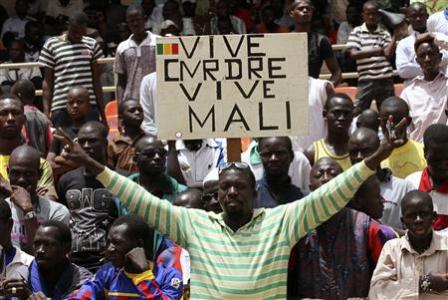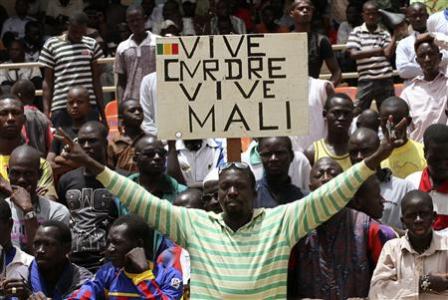Mali: democracy, the coup and the anti-globalization left – Right Questions, Wrong Answers? – By Gregory Mann

Over the weekend, Mali’s political drama cut to Ouagadougou, where President Blaise Compaore hosted a meeting of Malian politicians and statesmen, the military junta that seized power on March 22nd (the CNRDRE), and ECOWAS. All eyes were on Ouaga, as well as Timbuktu and Gao, were a rebel alliance seemed to be splintering, but not everyone was there. Shut out of that conversation, and out of almost all of the press coverage of Mali’s double crisis, were Mali’s anti-globalization Left. Active in Bamako, and present on the internet, those champions of “a different globalization” had come out in support of the junta. Why did they support military rule? And why they stand against the rest of the political class?
The Front
After the CNRDRE ousted Malian president Amadou Toumani Touré (ATT) in a putsch, many Malians, most of the country’s neighbors, and much of the international community condemned the coup and the junta behind it. Although ATT himself had few champions, civilian rule did. Some fifty political parties and a hundred labor unions and civil society groups in Mali formed a Front du Réfus (later called le Front Uni pour la sauvegarde de la démocratie et la république). They agreed to boycott the junta, to refuse to serve in the government that it was trying to form, and to push for a return to constitutional life. Solicited by the junta to serve under it, at least two of the leading presidential candidates (for the cancelled April elections) demurred.
On the Monday following the coup the Front rallied at Bamako’s Labor Exchange (Bourse du Travail), a site which played an historic role in the events that launched Mali’s democracy in 1991. The following day, their demonstration was over-shadowed by another, larger one against ATT and in favor of the junta. The day after that, Wednesday, a pro-junta crowd attacked the Exchange and soldiers detained several leaders, putting a brake on open opposition. Still, the tactic of the Front was clear: unite to deprive the junta of any civilian camouflage, thereby forcing it back to the barracks. For three weeks – until 16 April – they held the line, only breaking ranks once the transition back to civilian rule looked to be underway.
A great deal of tactical maneuvering is going on behind the scenes, but for all the corruption, nepotism, and pettiness that characterize Mali’s political class, this may have been its finest hour. The absolute refusal of the country’s political leadership to engage with the junta, which continues to detain and harass members of the previous government, was a brilliant tactic. As the junta floundered, it lost support and became desperate for solutions. The civilian opposition could not kill it, but they could quarantine it and let it weaken on its own.
This worked, even if the Front’s quarantine was only one among many factors. On March 27th, the CNRDRE proclaimed a new constitution, only to be forced to withdraw it and return to the old one, established in 1992. When Captain Amadou Haya Sanogo, the junta’s leader, called a national conference for April 5th, the Front refused en bloc to attend. Sanogo had to back down in the face of embarrassing evidence that after twenty years of democracy, civilians would not take orders from soldiers. The conference was cancelled.
Rather than responding to Sanogo’s summons, fifty-three women’s associations marched for a return to the constitutional order. The National Council for Civil Society and various Human Rights associations made the same plea, which, remarkably, the national television station broadcast. Malians have a lot to talk about, and an open debate on real issues of economy, society and social justice would be a welcome break from years of disenfranchisement and disenchantment. Still it had become clear that, if Mali were to hold a national conference, a man in khaki could not call it.
Breaking Ranks
One thing a modern junta needs is civilian support, something that will let it appear legitimate and allow its inevitable claims about “organizing elections” and “returning to the barracks” to gain some credence. In Bamako, only one political party with a representative in parliament, Solidarité africaine pour la démocratie et l’indépendance (SADI), accepted the idea of forming a government with the junta. Asked whether he would serve as Prime Minister under the CNRDRE, Dr. Oumar Mariko, a parliamentarian and the party’s president, declared “Why not?”
Mariko is well known in Mali. As the leader of the students’ union, he played a catalyzing role in the events of 1991. Older, but not necessarily wiser, he has become an eternal candidate and a perennial bad boy in the political system. As for SADI, the party takes strong and often commendable positions, such as resistance to land expropriation in the country. A signature issue for both SADI and Mariko is a critique of the political economy of cotton – Mali’s most important crop. It is in the cotton fields where world markets and the lives of Malian farmers most directly intersect, often with brutal effects. In the wake of debilitating neo-liberal reforms, this system like so many others doesn’t work for Malians. When the coup occured, SADI hoped a revolution was at hand.
Taking a cue from Senegal’s influential M23 movement, which was organized last June against the candidacy of then-President Abdoulaye Wade, Mariko and allies launched an initiative they dubbed MP22, or “Mouvement populaire (March) 22,” in support of the junta. Their role at the Labor Exchange is debated, but a week after the coup, MP22 mobilized demonstrators to block the tarmac at Bamako-Senou airport so that a delegation of ECOWAS leaders could not land. Forced to turn back, the ECOWAS group held an angry, improvised meeting in Abidjan, where they agreed to inflict harsh sanctions on the country and began to talk of military intervention. Both MP22 and ECOWAS might have overplayed their hands. It was hard to avoid the impression that MP22 had merely provoked the beast it professed to abhor, and in a statement to the press the next day, Captain Sanogo implicitly distanced himself from the movement. As for ECOWAS, if flying three heads of state into Bamako to tell the junta what to do seemed imperious, imposing a trade embargo on a poor, landlocked country that relies on remittances was downright hostile, particularly in a period of civil strife. At the time, no one knew how long such sanctions might last, and what their effects would be. Within a week, Sanogo blinked, or at least backed off, but not before ECOWAS’s harsh talk had provoked a nationalist reaction.
Aminata Dramane Traoré – essayist, ex-Minister of Culture, leading figure in the francophone anti-globalization movement, and die-hard supporter of deposed Ivorian President Laurent Gbagbo – took the lead. In a press conference she gave even as the ECOWAS delegation – led by the man who replaced Gbagbo, Alassane Dramane Ouattara – was en route for Bamako, Traoré pulled no punches. For her, “there was already a vacuum in the governing of the country. And it’s this vacuum that we must fill with these young soldiers, who responded to the people’s call… We don’t have to take lessons from anyone!”
On April 4th, with Traoré in the lead, more than a dozen leading Malian and other West African intellectuals signed a “Chronicle of a Planned Recolonization” (“Chronique d’une recolonisation programée”) damning ECOWAS and its embargo and condemning Mali’s political parties for their self-interested defense of a flawed democracy. Mali was not endangered by military rule, they argued, but by a “formal democracy and by geopolitical, economic, and strategic stakes about which the ordinary citizen has no idea.” In short, they argued that the junta itself was no danger to the nation; rather, ECOWAS was the true menace, representing a form of neo-liberal encroachment on Mali’s sovereignty.
If Traoré knows the tune, Seydou Badian Kouyaté wrote the lyrics, literally. Fifty years after composing Mali’s national anthem, Seydou Badian, as he is generally known, is an elder in a country where age means everything. Always a man of the “˜revolutionary’ Left, Seydou Badian too believed that the coup might offer an opportunity to “uproot the system.” The junta wouldn’t leave power quickly, he argued, because “they came to do something, and they have to accomplish it.” Still, he held, this was no reason not to support them. Seydou Badian’s words have to be taken seriously because no-one knows better than he does that Mali has been here before. In 1968, when a coup overthrew Mali’s socialist government, part of the Left applauded the new junta, hoping that those young soldiers would bring true socialism. Instead, Seydou Badian suffered seven years as a political prisoner under their rule, and Mali endured over two decades of stagnation, misery, and dictatorship. Seydou Badian survived; many others did not.
The CNRDRE
The junta did not take power in order to re-establish democracy, and it is still not clear that they plan to give it back. True, Sanogo agreed to step aside and allow a constitutional transition, following ATT’s resignation. The Speaker of the National Assembly, Dioncounda Traoré, has now stepped in. Still, it is far from clear that Traore and his newly appointed Prime Minister, Cheikh Modibo Diarra, will be able to assert their independence from the junta. The first challenge is already before the new civilian team. Even as the politicians returned from their weekend in Ouagadougou and as the name of the Prime Minister was being announced, soldiers arrested two ex-presidential candidates – Soumaí¯la Cissé and ex-Prime Minister Modibo Sidibe – along with several others, including the former Minister of Defense. This timing is not coincidental: Sanogo has balanced each of his concessions with a show of strength. When he agreed to re-establish civilian government, he simultaneously charged ATT with high treason. Now, as he allows a new government to form, he demonstrates that the army still holds power, and he removes several pieces from the chessboard. This balance between concession and repression is abetted by the fact that Sanogo’s pronouncements in Bambara on national television are much less conciliatory than his comments in French, as several people have pointed out.
More is soon to come. Everyone agrees that elections are impossible in the forty day period mandated by the constitution. The accord that the junta and ECOWAS signed leaves the next steps deliberately, perhaps dangerously, vague. But the pas de deux over the last two weeks only introduces what will surely be a long and improvised dance.
Even in such a dynamic situation, one thing has been clear from the beginning. The soldiers took power because they were angry about the war in the North and because, as Aminata Traoré said, a corrupt and supine regime refused to fight, or even to govern. But most of all, they took power because they had guns and because it was available to them. Once they had it, there was no telling what they would do with it. They themselves were unsure, as their muddled statements and erratic actions quickly revealed. Was there any reason to count on them using it to advance any particular position that the anti-globalization left holds, other than that of preserving the integrity of the nation’s territory? That point was not peculiar to either group – the vast majority of Malians, including many in the regions of Timbuktu and Gao, would agree. Yet having lost the two cosmopolitan cities of the southern Saharan fringe over one weekend, the junta has left a new civilian transitional government with a devilish problem and a ticking clock.
The challenge for Mali – not only for Malian democracy, but for Mali as a secular, multi-ethnic state – is existential, and it doesn’t come from Abidjan or Ouagadougou.
Gregory Mann lectures African history at Columbia University.








[…] Gregory Mann has noted, hardly anybody in the news media is reporting on this. So Mann did his own report and analysis. In fairness, Voice of America has done a good job covering what’s going on in […]
[…] crisis as pitting Mali’s needs against sinister foreign agendas, as the country’s anti-globalization left has been depicting things all along. Up till now those radical anti-ECOWAS voices have been a tiny fringe, but in light of the […]